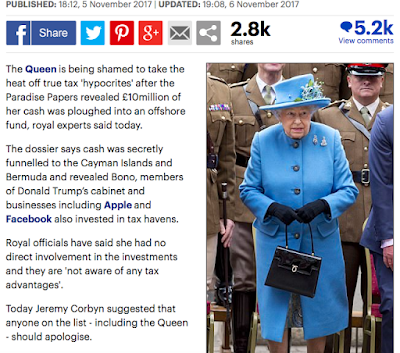Social and participatory media: Case Study- News story coverage of The Paradise Papers
Paradise papers study
On Monday 6th November, the main headlines covered leaked documents revealing the financial details of the super-rich. It outlined how many were allowed to keep money outside of the UK in order to avoid paying tax. Newspapers covered this story differently due to their ideologies and news values. The Guardian, for example, is socialist so therefore show a balanced argument as although they endorse capitalism, they view the uncovered information as a scandal. The Daily Mail however view the Queen (who is one of the accused of putting money in offshore accounts) as the victim through the use of the word 'dragged' in their headline. The Daily Mail also on their front page features Netflix series 'Stranger Things' celebrity Millie Bobbie Brown and labels her to be simply a 'Bournemouth school girl worth £5 million' which almost degrades her in a sense as she is a talented actress yet is simply a 'school girl' due to her young age. However this could also be viewed to be the Daily Mail attempting to illustrate how young she is and avoid the Male gaze in this article. This is reinforced by the clothing Millie is wearing as she is covered up compared to another woman on the front page who is unzipping her dress relating to a slimming story. Stereotyping of women is also seen on the front page through the victimising of the Queen.
The Guardian has a contrasting view due to its ideologies and news value. As the Guardian has no main owner (instead it is owned by multiple influential people) the ideologies cannot be passed down from one main person unlike the Daily Mail. This therefore means that as a free press, the Guardian cannot be critical of this matter as they are against capitalism and the ownership of great power and money. They consequently take a moralistic view and account for the whole country with socialism by relating to the fact that money is not going to the people of the UK through tax which therefore affects organisations such as the NHS who are renowned to be struggling currently with lack of money.
Comparing the two papers, the Daily Mail victimises the Queen whereas the Guardian uses negative language and criticises her, 'accused of exploiting the poor'. This contrast shows the difference between the quality socialist broadsheet and the monarchy supporting tabloid.
The use of colour in this story in the Guardian exemplifies the scandal by using the highlighter tone of yellow. This colour represents the papers ideology and the importance the story holds. Stories such as ones involving the Tories are highlighted which associates the tax scandal with the other story purely because of the papers ideology . The colour may be used to represent the coin and therefore riches. This is enforced by the Queen's head image which mimics a coin and connotes the economic emphasis of the story.
The Guardian created a series of news stories on the front page over a number of days in order to highlight the scandal and show their ideologies. Over the days the newspaper enforced their negative views of the event by colourising the story with yellow and even branding the story with a logo of a coin in the sea like the sun setting. This enforces their socialist and anti-capitalism views by having in-depth exploration of not only the Queen but also Charles and Lewis Hamilton.
The Mirror is also a left-wing paper who also criticised the Queen in their coverage of the story. The Daily Telegraph however is conventional of the traditional broadsheet style and therefore lacks in bias or expression of their ideologies. The Daily express uses the story as a picture headline and instead chooses to write about the weather as their front page news (odd yet typical of their style). And finally the independent is a factual broadsheet and prides itself on its objectivity so therefore covers the story with no particular agenda.
The Guardian can be related to both the uses and gratification theory and the cultivation theory. The uses and gratification theory is explored by the Guardian through the use of the multiple issues and main agenda which the target audience approves of and therefore gains a sense of revelation as the audiences ideology is recognised and matched by the papers. This particularly appeals to socialists. Gerbner's cultivation theory can be applied to this newspaper as multiple issues of the Guardian cover the same 'Paradise Papers' story which would show the constant exposure and multiple issues reiterating the same ideologies repeatedly in order to get the information across. More importantly this usage of the same story creates more of an impact and shock as it appears more scandalous as more people and celebrities are being exposed. This repetition also saves the paper money as they are recycling one particular story and exploring it in greater depth.
Online coverage
In these online versions the ideologies and main agenda has remained the same. The coverage of the story differs slightly however due to the different platform. The Guardian still shows a left-wing side to the story and begins the story with a video of the Queen explaining the story. Another video is also used later
on explaining in detail what the Paradise Paper's are. Here on the left hand side is a link on The Guardians page to a relating story which gives more detail to the Paradise Papers. These elements are only available on the online platform as the newspaper in print form cannot offer videos or other stories as the online version can.
The Daily Mail's story is again similar to its print version yet begins the article with a series of bullet points summarising the story. It then goes on to address the story in more depth with multiple photos and a video link. This online version also offers clear social media links which the print version cannot. As shown above the story has generated 5.2k comments and 2.8k shares. This ability to link to social media links to the uses and gratification theory as it generates social interaction through the comment section which consequently generates an opinionated comment which either agrees with the story or disagrees.




www: A detailed analysis with clear focus on the media terms and some reference to academic ideas via media theory. EBI: Check your use of some of those terms is correct in context (objectivity). A free press refers to all newspapers, which are not controlled by the state. Adding more detail to the online news analysis will improve this further.
ReplyDelete